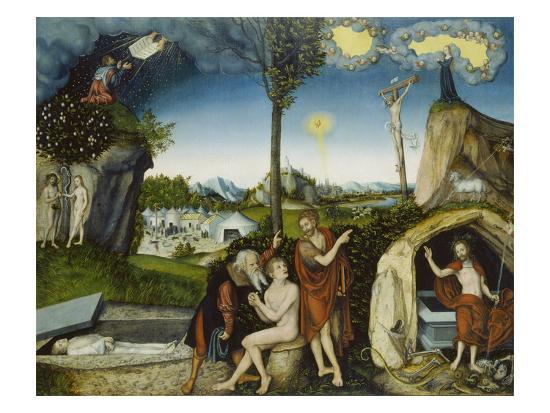One of my favorite pieces of art was painted by the reformation era artist, Lucas Cranach the Elder, and is titled Fall and Redemption of Man. I love it so much that a print of it hangs in my office. Oftentimes, I catch myself looking at it to make sense of the many intricate details in the piece.
Cranach’s painting, in a single canvas, captures the entire biblical storyline through biblical symbolism and imagery. It is a masterpiece and somehow communicates the very good news of the Gospel without using a single word.

If you were to look at it as much as I have, you would also be able to recall its scenes to your mind on cue. Scenes that would remind you of the biblical stories attached to them along with the theological significance of the faithfulness of God throughout the ages.
So, what does this have to do with the importance of worldview?
In the same way I can quickly recall the stories, imagery, importance, and theological significance of the biblical scenes of the print on my office wall because I am so familiar with it, so too must our people be able to make sense of the world around them by applying a biblical framework to the world they inhabit.
When challenged by the perversion of culture, the ideologies, the personal sinful choices of friends and family, or simply their own struggles with sin, we must be able to make sense of it in light of the biblical story and our place within it.
If we can’t make sense of the world around us with the anchor of God’s perfect Word as our guide, we truly are going to be thrown to and fro with the winds of opinion and change (Hebrews 6:19-20).
Become Familiar
The first step is helping our people become familiar with the story of God’s work in his world, often laid out simply as: Creation, Fall, Redemption, and Restoration. If our church members can’t articulate or know this story by heart, how do we expect them to rightly apply scriptural principles and the Gospel to their lives in a lost world?
Find Their Place
Once we are familiar with the story we must find our place within it at both a macro and micro level. We find ourselves as New Testament believers smack dab in the middle of the already/not yet of the Kingdom of God. We experience the redemption of God’s Kingdom in part, but still have the effects of the Fall to deal with both personally and in our world. We’re called to be a part of God’s Church by grace. His chosen tool to see the already of the Kingdom take more and more ground under the sovereignty of Christ.
On an individual level, we are called to participate in this work of redemption with the gifts, skills, and passions the Lord has given us. We are still bound by the cultural mandate given to humanity pre-fall (Gen 1:28-30). As we fully understand and embody the good work of having dominion over the creation for the purpose of causing harmony and flourishing, people will be helped to find their place and will be lead to embrace the work of the church in our communities to bring and preach the Gospel in both word and deed.
Continuity is Key
In Cranach’s painting, there are no sharp lines distinguishing one age from the other nor one defining line that would allow for us to think God sees his work in his world as fractured in the ways we see it.
Our place in redemptive history is not unique to other believers in all of history – we just find ourselves in the time and place where God put us (Acts 17:26). Ever since sin entered the world, God has been about the work of redemption and we, along with those who came before and will come after us, are another thread in the great tapestry of redemption he is creating.
Until we grasp this, we will always be stunted in our impact on our world. But when we understand our place in the sovereign plan of redemption, then and only then can we be free to truly work to see the Kingdom come.
Pastor, if you want to free your people to do the work of the Kingdom, help them find their place in God’s world as a priority.

